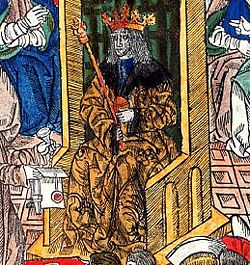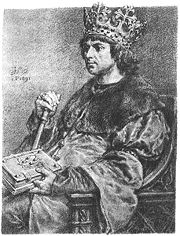Alexander Jagiellon
| Alexander Jagiellon | |
  |
|
| Reign | 30 July 1492-19 August 1506 (Grand Duke of Lithuania) 12 December 1501-19 August 1506 (King of Poland) |
|---|---|
| Coronation | 30 July 1492 in Vilnius Cathedral as Grand Duke of Lithuania 12 December 1501 in Wawel Cathedral as King of Poland |
| Born | 5 August 1461 |
| Birthplace | Kraków, Poland |
| Died | 19 August 1506 (aged 45) |
| Place of death | Vilnius, Lithuania |
| Buried | Vilnius Cathedral, Vilnius, Lithuania (1506) |
| Consort | Helena of Moscow |
| Offspring | Male (Name Unknown) by Helena (Disputed) |
| Royal House | Gediminids, Jagiellon |
| Father | Kazimierz IV Jagiellon |
| Mother | Elisabeth of Austria |
Alexander Jagiellon (Lithuanian: Aleksandras Jogailaitis; Polish: Aleksander Jagiellończyk; 5 August 1461 – 19 August 1506), Grand Duke of Lithuania and later also King of Poland; he was the fourth son of Casimir IV Jagiellon. He was elected Grand Duke of Lithuania on the death of his father (1492), and King of Poland on the death of his brother Jan I Olbracht (1501).
Contents |
Biography

Alexander's shortage of funds immediately made him subservient to the Polish Senate and nobility (szlachta), who deprived him of control of the mint (then one of the most lucrative sources of revenue for the Polish kings), curtailed his prerogatives, and generally endeavored to reduce him to a subordinate position. For want of funds, Alexander was unable to resist the Grand Master of the Teutonic Knights or prevent Grand Duke of Muscovy Ivan III from ravaging Grand Duchy of Lithuania with the Tatars. The most the Grand Duke of Lithuani could do was to garrison Smolensk and other strongholds and employ his wife Helena, the Tsar's daughter, to mediate a truce between his father-in-law and himself after the disastrous Battle of Vedrosha (1500). In the terms of the truce, Lithuania had to surrender about a third of its territory to the nascent expansionist Russian state.
During his reign, Poland suffered much humiliation at the hands of her subject principality, Moldavia. Only the death of Stephen, the great hospodar of Moldavia, enabled Poland still to hold her own on the Danube River; while the liberality of Pope Julius II, who issued no fewer than 29 bulls in favor of Poland and granted Alexander Peter's Pence and other financial help, enabled him to restrain somewhat the arrogance of the Teutonic Order.
Alexander Jagellon never felt at home in Poland, and bestowed his favor principally upon his fellow Lithuanians, the most notable of whom was the wealthy Lithuanian magnate Michael Glinski, who justified his master's confidence by his great victory over the Tatars at Kleck (5 August 1506), news of which was brought to Aleksander on his deathbed in Vilnius. There is some evidence that he had at least one son, leading to a surviving Jagiellon branch, although this is not conclusive.
It is important to note that Alexander Jagellon was the last known ruler of the Gediminids dynasty to have maintained the family's ancestral Lithuanian language. From his death, Polish became the sole language of the family, thus fully Polonizing the Jagiellon family.
Ancestors
|
|
|
|
|
|
|
|
|
|
|
|
|
|
|
|
|
Algirdas | ||||||||||||
|
|
|||||||||||||
|
|
|
|
|
|
|||||||||
|
|
Jogaila |
|
|||||||||||
|
|
|||||||||||||
|
|
|
|
|
|
|
|
|
||||||
|
|
Uliana Alexandrovna of Tver | ||||||||||||
|
|
|||||||||||||
|
|
|
|
|
|
|||||||||
|
|
Casimir IV Jagiellon |
|
|||||||||||
|
|
|||||||||||||
|
|
|
|
|
|
|
|
|
|
|
|
|||
|
|
Andrew of Halshany | ||||||||||||
|
|
|||||||||||||
|
|
|
|
|
|
|||||||||
|
|
Sophia of Halshany |
|
|||||||||||
|
|
|||||||||||||
|
|
|
|
|
|
|
|
|
||||||
|
|
Alexandra Drucka | ||||||||||||
|
|
|||||||||||||
|
|
|
|
|
|
|||||||||
|
|
Alexander Jagiellon |
|
|||||||||||
|
|
|||||||||||||
|
|
|
|
|
|
|
|
|
|
|
|
|
|
|
|
|
Albert IV, Duke of Austria | ||||||||||||
|
|
|||||||||||||
|
|
|
|
|
|
|||||||||
|
|
Albert II of Germany |
|
|||||||||||
|
|
|||||||||||||
|
|
|
|
|
|
|
|
|
||||||
|
|
Johanna of Bavaria, Queen of Bohemia | ||||||||||||
|
|
|||||||||||||
|
|
|
|
|
|
|||||||||
|
|
Elisabeth of Austria |
|
|||||||||||
|
|
|||||||||||||
|
|
|
|
|
|
|
|
|
|
|
|
|||
|
|
Sigismund, Holy Roman Emperor | ||||||||||||
|
|
|||||||||||||
|
|
|
|
|
|
|||||||||
|
|
Elisabeth II of Bohemia |
|
|||||||||||
|
|
|||||||||||||
|
|
|
|
|
|
|
|
|
||||||
|
|
Barbara of Celje | ||||||||||||
|
|
|||||||||||||
|
|
|
|
|
|
|||||||||
Gallery
References
- ↑ Wawel Castle. History of the Royal Residence.
See also
- History of Poland (1385-1569)
- Sejm walny
- St. Anne's Church, Vilnius
External links
| Preceded by Kazimierz IV Jagiellon |
Grand Duke of Lithuania 1492–1506 |
Succeeded by Zygmunt I the Old |
| Preceded by Jan I Olbracht |
King of Poland 1501–1506 |
|
|||||||||||
|
||||||||||||||||||||||||||